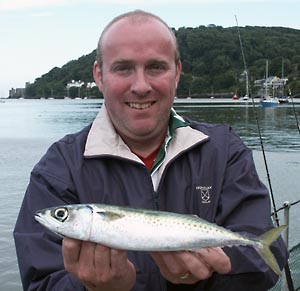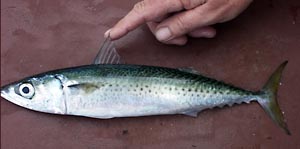 fishing Dartmouth sea angling torbay festival Devon uk charter boat shore plaice turbot bass river dart |
||||
Scomber Japonicus - The Chub
Mackerel |
||||
|
Friday 29th July - I have just returned from taking several photographs of a “Chub Mackerel” Scomber Japonicus, caught on the “Skerries” off Dartmouth, on the last drift of the day, when it took a Plaice bait on the trace of Chris Mayes from Leicester, who was a holiday visitor, fishing with friends. Chris was aboard Alan & Hilary Hemsley’s Dartmouth charter boat the “African Queen”.
I regret Chris is apparently unable to submit the Chub Mackerel for the British Record claim to the British Rod Caught Record Fish Committee. In the cold light of day I visited the British Rod Caught Record Fish web page www.nfsa.org.uk/ntcg/brfc/record_list.htm and I saw that the species “Scomber Japonicus” which is what we accurately identified it as, is already recorded under its correct Latin name. They do however give it the common name “Spanish Mackerel” which is actually a misnomer – the Name “Spanish” is in common usage in North American waters for this species, rather than the correct nomenclature of “Chub Mackerel”. The boat caught record for the species is currently 1 lb 5 ozs 4 dr, which has been held since 2001 by a K. Johnson, caught at Kadgwith Cove, Nr. Helston, Cornwall. Incidentally, the shore caught record stands at 1 lb 10 ozs 10 dr and is held by a local angler, Sean Coulson, who caught it in 2003 while fishing from Princess Pier, Torquay. As Chris' fish weighed-in yesterday evening at just 14 ozs 8 dr, on the certified flatbed scales at Dartmouth Angling & Boating Association’s clubhouse, it’s sadly not a contender for any records, but is still a fascinating fish to catch. I feel privileged to have seen one. Incidentally the true Spanish Mackerel, Scomberomorus Maculatus, is shown in the International Game Fish Association handbook on page 355 of the 2005 edition. It is an entirely different species which led to my initial confusion. I have sent an Email to the British Rod Caught Record Fish Committee for their urgent attention. I believe this species common name must be sorted out and corrected without delay in order to avoid future confusion. The species Scomber Japonicus (Chub Mackerel), incorrectly referred to as Spanish, by the BRCRFC is relatively rare in our local waters. The fish has been retained in my home freezer for identification purposes if required. The reference books tell us that it is most commonly encountered in all the temperate and warm oceans, particularly off Japan and China. Its range does not extend as far north as that of the Mackerel, though distribution maps do suggest that it can occasionally be caught off the Continental shelf beyond Lands End. It resembles our common Mackerel, Scomber Scombrus, but with several distinct variations. Its main characteristics are that it has a swim bladder; larger eyes; fewer than 9 rays in its first dorsal fin; and substantially larger scales in the area between its operculum (gill covers) and its pectoral and ventral fins. Its colouring is also very different. It has dark grey blue spots below its lateral line and on its belly. And the dark zig-zag stripes on its back are less pronounced than in the common Mackerel. There are also clear differences in the shape of the rear dorsal and ventral fins. The true Spanish Mackerel Scomberomorus Maculatus is a very different fish. I have studied my reference handbooks, covering these two quite distinct species, together with a photo of Chris' fish. The rear dorsal and ventral fins are very different on a true Spanish Mackerel, which in any case grows to far greater size. It must be a sign of global warming affecting our seas that such species are appearing, admittedly in small numbers in our UK local waters.
Once again I commend Chris on catching
such an exciting specimen. I wish we could submit it
for a UK record; sadly we can’t.
Saturday 30th July - Reply received today from David Rowe of the NFSA ref the Chub Mackerel "Common" name problem. Dear Mike - Thank you for your interest and comments on the Spanish Mackerel, I do not feel qualified to form an opinion at this time without further consultation with our Scientific advisor Mr Oliver Crimmen of the Natural History Museum and I have written to him today on the subject. As you will be aware the BRFC has had the privilege of the services of the Natural History Museum for many years and indeed that of the late Alwyne Wheeler who was the most highly acclaimed ichthyologist, who identified fish for the committee for nearly 20 years. He was recognised as the definitive authority on fish species and was the author of many comprehensive books and his classic book “Key to the fishes of Northern Europe” is still a bible for all those who have an interest in fish species within Northern Europe and beyond. Alwyne’s advice on such matters was always sought and the BRFC list was compiled with his input and that process continues with his successor Mr Crimmen. I will write to you again on receipt of his advice Kind regards - David Rowe - Secretary to the BRFC. (ED: Here's a copy of the Emailed response I sent back to David) Dear David - I appreciate your position and thank you for your swift reply. It does seem a little silly to use a “Common Name” which can be so easily confused with another separate species which is properly known by the same common name. It can be so very simply rectified. - Best regards - Mike Thursday 14th August - Email received this morning from my good pal and Torbay ex-pat Grahame Garry who lives in Perth Western Australia. Here's what Grahame has to say: We catch narrow banded Spanish Mackerel. The West Aussie record is 46 kgs, which is a bit bigger than Sean Coulson's, which he caught off Princess Pier in Torquay. It's not the same type. In your reports I see a Chub Mackerel, we get the same here, but we call them "Blue Macs." (ED: Yibbida Yibbida - Its always good to hear from Grahame - we exchange many emails - Thanks mate! Time for a "Tinnie"). Here's what Doug Herdson from the National Marine Aquarium has to say on the subject of Common Name for the species. Spanish Mackerels
Everyone looking at a fish in Britain must acknowledge that we would be getting nowhere without the tremendous work done by Alwynne Wheeler. However anyone using common names of fish rather than scientific ones will encounter problems. Also it appears to have been Wyn’s practice to use the English name that was most commonly used it the British Isles, which was fine when simply considering the fish of north west Europe but can lead to problems when looking at fish worldwide and when unfamiliar species turn up in British waters.
For example he used “Seahorse” for Hippocampus ramulosus, when there are around forty species of seahorse known (this species is now known as Hippocampus guttulatus with the English names Spiny, Maned or Longsnouted Seahorse).
To the best of my knowledge the name "Spanish Mackerel" has only been used for the world wide species Scomber japonicus in north west Europe from the Azores to the Faeroes and Scandinavia (including Spain, France, Netherlands, Germany and Britain While it has been used almost universally for the eighteen species of Scomberomorus; and in the USA for Scomberomorus maculatus, which is probably better called the Atlantic Spanish Mackerel.
To make things even more complicated “Mr Mackerel” Bruce Collette of the National Museum of Natural History in Washington, the acknowledged authority on the Mackerels and Tunas, in a paper in 1999 separated the Atlantic Scomber japonicus from the Pacific species giving it the name Scomber colias.
So as I understand it we have four species of Scomber mackerel species world wide - Scomber scombrus, Scomber colias, Scomber japonicus and Scomber australasicus; The first two in the Atlantic Ocean and the others both in the Pacific and Indian Oceans.
Their suggested English names are as follows:- Scomber scombrus – Atlantic Mackerel Scomber colias – Atlantic Chub Mackerel Scomber japonicus – Chub Mackerel Scomber australasicus – Blue Mackerel
In fact Wyn may have solved the problem for us because in his last published work “ Additional records and notes for Wheeler’s (1992) List of the Common and scientific Names of Fishes of the British Isles” A. C. Wheeler, N. R. Merrett and D. T. G. Quigley (2005) they give –
Scomber colias (Gmelin, 1789) Atlantic Chub Mackerel
Following revisionary work by Collette (1999) and Collette et al. (2001) the Atlantic Chub Mackerel, previously listed as Scomber japonicus Houttuyn 1782, should be referred to in this form. In the aquarium world we have agreed to follow the scientific names for fish used in FishBase (www.fishbase.org), but I am sure that not all ichthyologists/fish taxonomists would agree with those; and I doubt that there will ever be an agreed (generally accepted) system for the English names, I just try to use the most logical, distinctive and universal.
ED: Doug - Many thanks for that detailed information - For any of you who do not know Doug Herdson and the detailed work which is continually updated via the National Marine Aquarium, I suggest a day in Plymouth visiting the NMA is a day very well spent. Doug is a good friend to all recreational sea anglers. I appreciate his vast knowledge and readiness to help. |
||||

